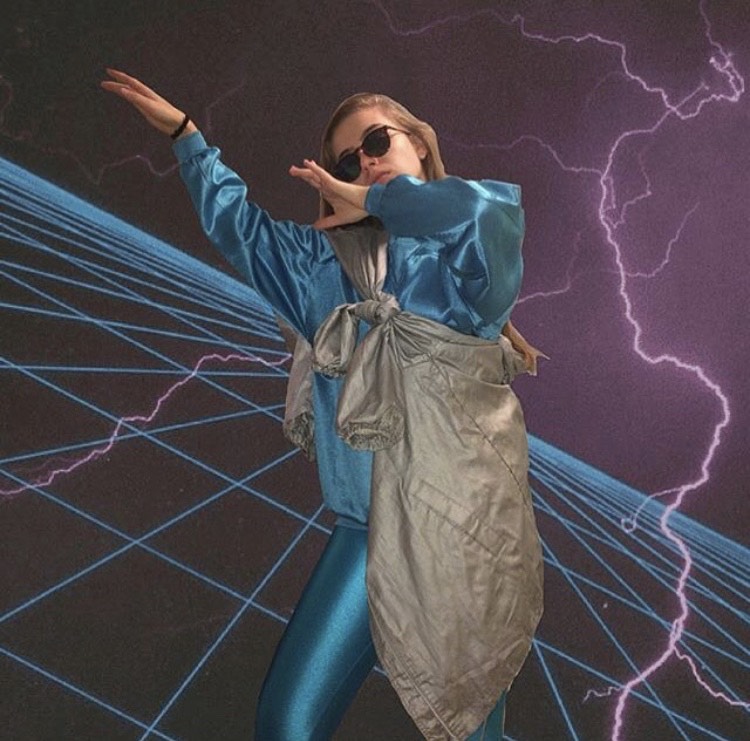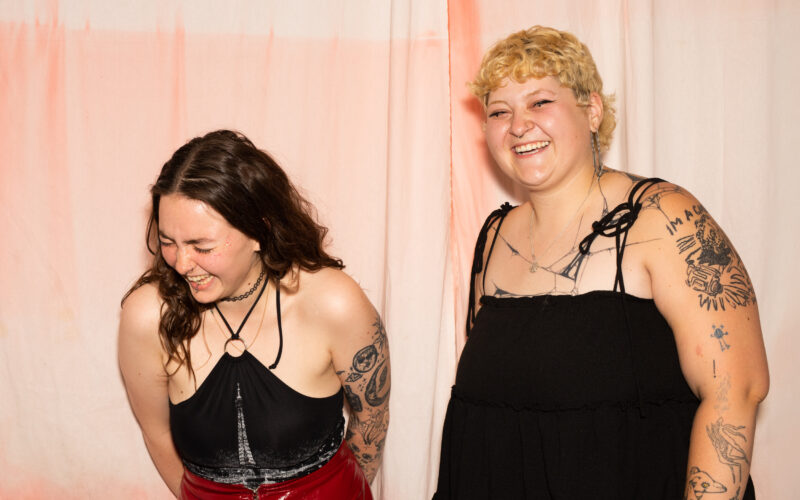The making of the scene #4: Interview with ravers Darina & Iurii
In the 4th edition of The making of the scene series David Verbuč returns to interviewing regular visitors of Prague’s dance music events. This time he speaks with Darina and Iurii, two local ravers whose initial love for clubbing grew into a passion, which now affects their daily routines and professional interests.

I talk to two regular local ravers in this interview. Darina is from Ukraine, and is 20 years old. She studies at VŠCHT and holds a job in the Ptákoviny online store. Iurii is from Russia, he is 26. He attends UMPRUM and works as a photographer. Both live in Prague already for six years.
In the interview, they talk about their rave beginnings and address the topic of pre-party rituals, and the importance of outfits in that regard, as they also acknowledge the influence of techno culture on their everyday lives. Further, they compare Prague and Berlin electronic dance music scenes and discuss gay dance parties and events. Moreover, they focus on safety, touching, caring, and empathy as well as on interacting with friends vs. strangers at parties. Lastly, they contemplate the place of Ukrainian and Russian ethnic minorities in Prague’s electronic dance music scenes.
We recorded the interview at Dobrá Trafika (Korunní), on March 12, the last day before the government closed down all of the coffee shops, restaurants and bars.
David: Which were the first places that pulled you into the electronic dance music scene in Prague?
Iurii: I think it was actually Ankali. I remember it was the DICK party (laughs). So nice!
David: And did you go to any other gay events before, in other places?
Iurii: I attended some gay clubs. But there is a difference between regular gay clubs and the underground scene. Different atmosphere, different vibes and attitudes. At that time I have just started attending gay clubs, but it didn’t feel the way I wanted it to be. And then I think because of my friend Lika, she’s a DJ [Ly Sas], I started listening to techno. Lika also invited me to some of her events, and then I became more interested and involved in the techno community, going more to techno events. And we also started going to Berlin together, she introduced me to Berlin clubs, first it was Griessmuehle, then Berghain, etc.
Darina: I knew about this scene for some time, before I even started going to parties. I knew some friends who were already part of it. One of my friends, Anna she was going to parties a lot. Once I asked her to take me to a rave with her. She took me to Ankali. The first time I came there, I was … not shy, but like, What is going on here? I was so introverted in those times. I was afraid to dance, I wasn’t feeling myself there.
David: Because it was something new for you, and different?
Darina: Yes, and Anna was already in this community for a longer time, she was more open-minded at that time. And I said to myself that I want to try it also. And the more I was going to parties, the more I was opening to this kind of stuff. I started to explore this music on Spotify, Youtube. I found a lot of techno artists that I liked. I started to meet a lot of new people at Prague’s techno parties, and started liking the techno community. I realized that they are okay with meeting new people, and that they are not aggressive. Ok, some of them are, but mostly not. The scene is very international, so everybody is like “Hi! I’m a new fiend! You can come to our country, to rave with us there!” And I started to be friends with DJs. And all this changed my mind in a lot of ways. It took down some of my boundaries. It’s very nice. And also afterward, I started to go to Berlin. My first club was KitKat.
Iurii: Uuu! (both laugh)
Darina: Our couchsurfing guest invited us to go there with him. And we said, Ha, why not! And it was a very interesting experience! But what happens in KitKat, stays in KitKat.
David: And which scenes do you follow here in Prague? Which clubs or events do you go to?
Darina: Mostly ONYX. I am a good friend with arnii and his girlfriend. In terms of clubs, I go to Ankali, Fuchs2. Sometimes to pop-up events, like CUKR, Komiks. Sometimes I just follow the artists that I like and go to those events.
David: And which types of genres you mostly like?
Darina: Techno! Also disco. But my playlists are full of really different types of music.
Iurii: I just like techno in general, and trying to support local DJs and local events. Mostly I support my friend Lika. I mostly go to ONYX parties, as she is part of the crew. But I feel I can’t get too comfortable in Prague, because when I am in Berlin, I feel I can express myself better there, and I don’t have to be afraid to be misunderstood. I can be what I want. Everybody can be naked, everybody can get wild there. Here, the scene is just in the beginning. But in a good way, and I think it will get more progressive. I think it’s a good start. There is a really good community here, supportive.
David: Can you maybe expand on this? You were talking about being comfortable—you mean in terms of sexuality, or other?
Iurii: I think in different ways. It depends on the mentality of Czech people. Germans, mostly Berliners, just don’t give a fuck. And I think this is fucking awesome (laughs). But in Prague, I am sometimes scared to express myself too much. Yeah. That’s it.
David: I want to talk more about these issues later, but first, tell me how do you party? What are your approaches to partying? How do you prepare for a party?
Iurii: Outfits! (laughter)
Darina: Yes, outfits! Mostly it’s a standard thing to be in black. In the beginning, I used to wear mostly black clothes, but afterwards, I just started to buy some extra stuff, like the kimono.
Iurii: I do the kimono too (laughter).
Darina: When I have an inspiration, I just do an outfit that is more extraordinary. I like when people respond to it, “It’s so cool! Where did you buy it?” For the preparation, outfit is the first thing. You think about it all day before the party. Then you come home, dress up, and then go to the event.
David (to Iurii): And you?
Iurii: I think Darina is correct. I noticed that the techno scene influenced me in my everyday life. And I started to think about what I am wearing. Before I started partying, I didn’t think so much about clothes. But now I feel this is a kind of a ritual, it makes you a part of the “family.”


David: And do you also dress up differently for parties?
Iurii: Yes, sure. I think about what I will be wearing, and what I will need to take with me. For example bubble gums (laughter). A lot of cigarettes, a lot of different stuff. Glasses, of course. Because, mostly you will finish in the morning, and you don’t want to scare other people in the metro. I really think parties make you think in a different way; what you really need; if these boots will feel comfortable for you, because you will be dancing all night. You should think about it in advance. It’s important.
David: You said that this scene influences your everyday life. Does it happen also in other ways?
Iurii: Yes. First of all, it influenced me in what I am wearing. Second, it also influenced me in my work. Music really inspires me. When I am at some party, lights, atmosphere and people really inspire me. You can see that in some of my photos because I am using poison-like colors. I think it’s an influence from parties. At some events, I often think about my projects on the dance floor, I can visualize them in my mind. I think it’s really perfect, when you can feel people around you, you can feel the music, and it opens you, it gives you inspiration.

From an editorial titled 'Homecoming queens', Kaltblut Magazine (2018), Iurii Ladutko

'Acid' (2019), Iurii Ladutko
David: And does it also affect your attitudes toward life, people, yourself?
Darina: Yes, a lot. It changed me a lot when I started to party, when I started to communicate with the people from this community. Also, it affected my borders. I had a lot of complexes before. It all fell down. I am more confident in myself now. I can speak with people without being shy. I don’t know… I got comfortable with my body also. It’s really great!
David: And if we continue with pre-party stuff, how do you contact your friends, if they are coming to a party?
Darina: For example, you put a story on Instagram, and add, “Are you going to this party?” And you get some responses, and from these, you choose who you will go with. And when you come there, you just know who you are gonna meet there.
Iurii: For me the main thing is friends you are partying with. Once I said to a friend at a party, “We dance together, we sniff together!” Not for record (laughs) [this became a ‘for the record’ manner of speech, in agreement with the author]. Friends are the main thing. If you are going with some friends, you should stick around all the time, and go home together. It’s important for your safety.
Darina: Except in some situations, when you need to go with someone else (laughs).
Iurii: Yes, but I remember I’ve met some French guy in Griessmuehle, and I wanted to leave with him. But my friend said, we came together, we go together, because, you don’t know the city, you can get lost. And I was, “No, I will be fine, I will be fine!” And in the end we went home together, and then I understood she was right. I think it’s about the respect for your friends.
David: Not to leave them alone there?
Iurii: Yes. But if they don’t mind, then it’s ok. But if you just get up and leave with a random guy, it’s not good.
Darina: You need to speak with your friends first, and if they are ok with that, then yes.
Iurii: But it doesn’t always work, because, if the people don’t know each other well, it can make it difficult.
David: So, partying with people that you know well is very important?
Iurii: Yes, because you know them really well, who they are, and you can trust them.
David: Also, you can probably synchronize better on the dancefloor with people that you know?
Darina: On the dancefloor, you are mainly by yourself. Even if you are standing right next to your friend, but still, you are there for the music, and you don’t interact on the dancefloor. Ok, yes, you smile at each other, but you don’t speak much in a sense of a normal dialogue. But yes, when you feel a friend standing or dancing behind you, you feel safer.
Iurii: Same.

David: What about the opposite? We were talking about friends, but what about strangers? You were saying earlier, before we started with the interview that it’s easier to meet and talk to strangers at these parties?
Darina: Yes, it’s easier, and they are more respectful. When you say no, it means no.
Iurii: Actually, at some gay parties, I don’t mind if somebody touches me. For me, it is difficult to talk to somebody, if they are not my friends. When there is a first step made from another person, then it is easier for me.
David: So, a touch by a stranger is not only a bad thing, but can also be a good thing?
Iurii: It depends. And there are different ways to interact in these kinds of situations. You can communicate with eyes, you can communicate with touches, you can just talk, ask for a cigarette, and stick around. And sometimes, it’s really scary. Some guy trying to stick around, like a stalker. I remember, we were in Berghain with my friend, and some older guy followed her. And I asked her, “Oh my god, this strange guy is following you!” And she replied, “That’s ok, he just gave me a foot massage!” When you are in a closed space, it’s easier to panic, because you can’t get away from a person. Some people just try to follow you. And it can be scary. Mostly in Berlin clubs, you cannot tell the security, because mostly they don’t speak English.
David: And how is it with the harassment, or with feeling safe and free at parties, if you compare both scenes?
Darina: Here, sometimes you can hear some people who are new to the scene saying “I just started to speak with a girl on a dancefloor and she just told me: ‘I want to dance, fuck off!’ It’s not normal!” And I was like, “It’s normal, because they come to dance, to listen to music, and if you are on the dancefloor, just dance!”
Iurii: Actually, I think we need more face control here, maybe. Some people just can’t behave normally and they disturb your personal space. They are touching everybody, and they distract you and screw up your mood. Mostly, they are tourists. They have just heard about this event, but they don’t know how to behave and don’t respect the local scene. And they don’t care. That’s the worst thing. They just don’t care. But for us, it’s our culture, for us it’s our home, and we are trying to respect each other. We feel like this kind of behaviour is disrespectful.
David: And if you compare it with Berlin?
Darina: Maybe it’s safer in Berlin, but there are lots of rape drugs there and stuff. Which are overused, for guys and girls. You can’t be safe anywhere.
David: And in Prague, are there some spaces or events that feel safer than other?
Iurii: Ankali.
Darina: Ankali, yes. They have good security.
David: What about specially dedicated events, LGBTQ+ parties?
Iurii: I think DICK is the best.
David: Why?
Iurii: Actually, I am not big fan of gay events. Because sometimes, I am not ok with the behavior of gay people, they can behave like whores. But at DICK parties, people still have respect for each other. Yes, of course, they are flirting with each other, it’s cool, but I still feel people care more about the music there. I don’t like gay pride parties, because they’re too gay. They’re too … I don’t know, maybe it’s just me. But I think DICK parties are just the best.
David: And if you compare it with Berlin clubs?
Iurii: Berlin is just Berlin. There are a lot of gays there. I think people in Berlin are more open and don’t give a shit about labels. I think a lot of people in Berlin can just hang out with boys or girls, it doesn’t matter. Parties are for everybody, and every party can be gay.
Darina: Once we went with my ex to a DICK party. We didn’t check what event will be there, we just came to Ankali. He popped a pill, and he was so emphatic to everybody. He took off his shirt there. And some of the guys started to interact with him. And I was like “Stop! This is my boyfriend!” It was uncomfortable.
Iurii: Maybe it was me! (laughs)
David: And was it consensual?
Darina: It was ok, because he was high. But it was funny that he took off his shirt and the guys started hitting on him.
David: So it was a bit uncomfortable to you, but not to him?
Darina: Yes, not to him! Hah.
David: And how is it at regular parties here in Prague, in contrast to DICK parties, regarding more open expression of sexuality?
Darina: You can notice it, but not so much as at DICK parties.
Iurii: I see it like a trend in the last two years. Before it wasn’t like this, I think. But now things are changing. Thanks to development of the drag queen scene, and also the changing of beauty standards, and the self-love, people are becoming more open and confident, not ashamed to show to the world who they truly are. People are less afraid to express themselves. And I’m glad this is happening. For me, expressing yourself is good, but on the other hand, it is important to have some boundaries. I mean, I can be free and do what I want, but I need to have some values and not lose my inner self that defines me like a person.


David: You talked earlier about the notion of caring at parties. Also in terms of physical interaction, which is not necessarily sexual. How do you see this?
Iurii: Actually, at parties, I try to care about people, about my friends, even about strangers. For example, I give out cigarettes all the time. I was in situations without cigarettes myself and I know how hard it is to ask for them sometimes. I am saying to myself, it’s karma, you’re giving, you’re receiving. Sharing is caring. So I think it’s really good, trying to be open, and trying to be nice. Also, if people are asking me about drugs, I say no, I don’t have it, but I know someone who does (laughter).
David (to Darina): And your experiences with caring, and similar?
Darina: Yes, from my childhood, I’ve been an empathic person. I am open and giving. For example, after the RUSH party we came to Concept for an after party. A lot of people were sitting there and communicating. After a while, we went to the store with my friend and another girl who we’ve met there. We bought a lot of bananas and came back to Concept, and started giving them to people — because you need potassium. And they were surprised:
“You are giving me bananas?!”
“Yes, you should eat right now, please!”
“Yes, ok, thank you!”
“Why are you giving me a banana?”
“Just because!”
David: That’s very nice!
Darina: When I have something, I share it with friends.
David: What about physical empathy. Either on the dancefloor or elsewhere at parties?
Iurii: It depends. If I like a person and he doesn’t bother me. If he touches me, it can be nice. But if I don’t like that person, I just try to get away. I don’t like to touch people at parties, but sometimes, when I am in a mood, I like to touch everybody. And it happens that I think it’s ok, but maybe it’s not. And it depends on your state. It depends on what you had. I think it happened just once, that I was touching everybody. It was at a DICK party, and I was, Oh my gosh, it’s like a Disneyland! (both laugh). So many beautiful guys, and me wanting to touch them. Because, everybody was high. Not for record. Everybody was so nice. And most of the people there just don’t mind if you touch them.
David: And it doesn’t have to be in a sexual way, right?
Iurii: Of course!
David (to Darina): And you?
Darina: Yeah. I like to touch my friends at parties. When we are dancing, when some of the tunes are coming up, and it’s like, Yay!, and we just start hugging and dancing together. Sometimes people are like intruding my personal space, and sometimes when I am not comfortable with that, I tell them literally to fuck off, but when they touch me, and I am ok with it, it’s like Ok, I’ll also touch you then.
David: How would you compare mainstream Czech society with the Czech techno scene, are there any differences in terms of your experiences?
Iurii: I think it’s different. In the techno scene, people don’t really care where you’re from. They just like you as a person. If you behave normally, they will behave normally towards you too. I think that’s the main difference. Because in the Czech mainstream society, at some regular party, you don’t know what kind of people you can meet there. The techno scene is underground, it is more like an alternative world, and a bigger part of people are trying to be nice. It’s like on that sign in Ankali toilets: “Respect is sexy.”
Darina: In mainstream society, they have some boundaries and some ideas about what is normal and what is not. And when you are more open minded, they are like “What are you saying? What the fuck? This is shit!” They don’t understand.
Iurii: I think the techno scene here mostly feels like a family, like a community of friends.
David: And would you say there is some sub-scene in Prague that is more related to Russian and Ukrainian people living here, or is it more mixed?
Darina: We have a lot of different ethnic groups that are hanging out a lot among themselves. But the groups know each other, they mix. The whole scene is very international. But you can still see groups of Russians who are not hanging out with Czech people, and they only hang out among themselves in normal life, and also at techno parties.
Iurii: Yes, actually, you can notice that in the Czech underground scene, the clubs often invite artists from Russia and Ukraine. And you can see that the local scene really supports artists from any country. They don’t make differences. If you are a really good artist and do your job well, people will like what you do, no matter where you are from and which nationality you are.
David: In the local techno scene, there are many events with artists from Russia, Ukraine, Georgia, and also many crews. It seems like people from ex-Soviet countries form an important part of the scene here.
Iurii: Yes, I think Russians and Ukrainians are contributing in a good way to this country. Many non-Czech people are making events, parties, exhibitions, they open cafes, and this also contributes to the economy and to the culture itself. For example, Wildt, ONYX, etc.
The making of the scene
What makes a music scene, what creates and sustains it and makes it thrive, is not only the music people, DJs, live performers, producers, record label owners or event organizers but also many other important actors. From party-goers who dance at events, materially create the party space with their bodies and communicate with DJs, thus co-produce the musical event, to workers behind the scenes, bouncers, box office and cloak-room people, bartenders, stagehands, light design artists and poster artists, who co-create the musical event and the scene as well. This blog will therefore explore through interviews the ways all these actors make the local electronic dance music scene happen from dusk till dawn, from weekend to weekend. It will explore their roles in the scene, their cultural values and observations, their goals and motivations, their experiences and skills, their patterns of action and interaction, and the differences between them in terms of their social and cultural position. Each trimonthly interview posted on this blog will be dedicated to one of these scene makers, alternating among them more or less equally: party-goers, workers behind the scenes, and music people.
Furthermore, the interviews will not only focus on Ankali club, but will cover the broader Prague electronic dance music scene. This is because the scene participants not only use and operate within singular places and events, but traverse multiple ones, and the blog will do the same, by following them in their nightclubbing pursuits.
Author and coordinator of the blog: David Verbuč
You can email us to ankali@anka.li, if you have any comments or questions about The making of the scene blog, or if you want to be interviewed yourself or with your friends.





